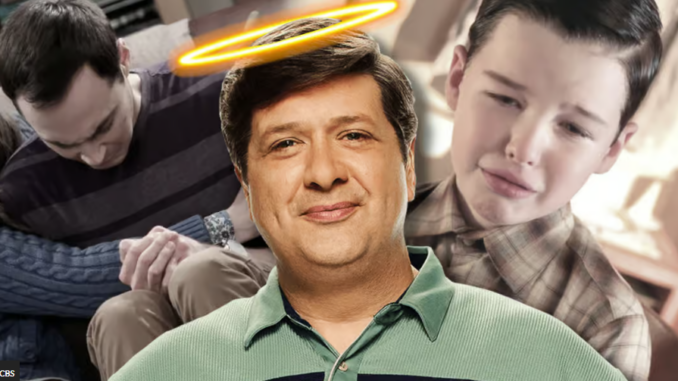
Young Sheldon unceremoniously killed George Cooper Sr in its latest episode. Here’s why that was the right way to kill off the fan-favorite character.
It finally happened. After seven seasons of Young Sheldon, George Cooper Sr has finally made his way to the big football game in the sky, and as upsetting as his death was, it got one thing shockingly right.
We’ve known George’s days were numbered since before Young Sheldon was even a glint in Chuck Lorre’s eye. The Big Bang Theory implied that George died of a heart attack when Sheldon was just a boy, and that show didn’t paint a particularly glowing portrait of the man.
Sheldon made his dad sound like a boorish, unfaithful idiot who kept his distance from his genius son. Yet Young Sheldon gave George a redemption of sorts. Yes, Sheldon was right; his dad wasn’t the brightest bulb in the box, and he didn’t always understand his son, but he was also a caring father, a doting husband, and an all-around nice guy.
Death and taxes…
 CBS
CBSPerhaps unsurprisingly then, fans fell in love with George, and knowing his death was on the horizon, they’ve spent the last few years lionizing his looming date with the Grim Reaper. There have been fan theories about how it would happen, Reddit threads dedicated to discussing the moment, and outlandish hopes that Lorre would change his mind and retcon George’s heart attack, all in the hopes of saving their favorite character.
But that was never going to happen (even if Lorre does regret killing him). Death, like taxes, is inevitable, and George’s story was only going to end one way. Still, the Young Sheldon writers’ decision to pull the rug from audiences and have George unceremoniously die off-screen away from his family was the right move.
Why? Well, people have a tendency to mythologize death. We write books, TV shows, and movies about how grand it is, and as a result, we see death as this big denouement. A final dramatic turn before the curtain comes down, and we take our bow. In our minds, it’s the full stop on the story of our lives.
But that’s not what death is. Death, to paraphrase Baz Lurhman, is the kind of thing that blindsides you at 4pm on some idle Tuesday morning. I speak from experience when I say it’s random, arbitrary, and cruel. In my case, it was a phone call from a stranger that changed my life forever, but death takes many forms. It’s an unanswered knock on the door, a trip to the doctor that goes terribly wrong; you go to work one day, and you never come back.
Death doesn’t care about your TV show
 CBS
CBSDeath isn’t writing a TV show. It doesn’t care about the drama of a situation. It’s just one minute you’re here, and the next you’re gone. It’s not fair, and for the services of this argument, it’s not dramatic. I think the Young Sheldon writers absolutely nailed this. They didn’t give George one last pep talk before sending him on his way. We didn’t see him win the big game before disappearing into the sunset. He just went to work one day and didn’t come home.
It’s a shockingly unflinching and true-to-life depiction of death, one that I didn’t think Young Sheldon was capable of. I think the show’s earnest and authentic depiction of death was a masterstroke (it reduced me to tears, and I’m only a very casual Young Sheldon watcher) that will blindside anyone who’s experienced loss. More than that, I think killing George in this way and leaving the drama for the two final episodes is the best way to tell this story.
We now get to experience the same shocking numbness the Cooper family is experiencing before hopefully getting some form of catharsis in the final two episodes.
If you want to know more about the Cooper family, we have guides breaking down the Young Sheldon cast and the Young Sheldon filming locations. If you’re new to the series and want to know where to get started, we have an article explaining how to watch Young Sheldon and the Young Sheldon season 7 release schedule.